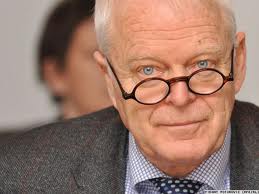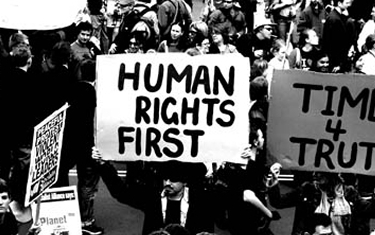Thomas Hammarberg, below, launched the publication Human rights and a changing media landscape at a press conference in London, hosted by Article 19, on 8 December.
Impunity encourages further murders
“Journalists are murdered or threatened with violence, state authorities seek to control broadcast med ia and prevent access to government information. At the same time we have seen that unrestrained commercial ambitions can encourage a culture of illegal and unethical activity in the newsroom – as the News of the World phone hacking scandal demonstrated with shocking clarity”, added Hammarberg.
ia and prevent access to government information. At the same time we have seen that unrestrained commercial ambitions can encourage a culture of illegal and unethical activity in the newsroom – as the News of the World phone hacking scandal demonstrated with shocking clarity”, added Hammarberg.
He highlighted the role media plays in exposing human rights violations and in offering an arena for different voices to be heard in public discourse.
Hammarberg argued that public service broadcasting is important to ensure media pluralism and counteract monopolies. He also underlined that every case of violence or threats against a journalist must be promptly and seriously investigated – impunity encourages further murders and has a chilling effect on public debate.
Social media presents new possibilities
“The phenomenon of social media presents us with a range of fresh challenges. Blogs, video and social networking sites have become key forums for political debate and organisation – so much so that they have provoked counter-responses from some repressive states. While there is a need to ensure better protection of personal integrity in social media, the right to freedom of expression must not be undermined”, underlines Hammarberg.
According to him, the traditional media have felt the pain of the global economic crisis as thousands of jobs have been eliminated, leaving little space for research, checking and original investigation – and training.
“The term ethical journalism is highly relevant in this context. The media community needs to develop a system of effective self-regulation – based on an agreed code of ethics – and a mechanism to receive and respond to complaints”, he suggests.
Prison tally reaches 15-year high
The Committee to Protect Journalists (CPJ) ahead of human rights day has presented its annual statistics of imprisoned journalists worldwide. CPJ has noticed that worldwide prison tally reaches 15-year high . In 2011 there were 179 reporters, editors, and photojournalists behind bar. This is an increase more than 20 percent over last year and the highest tally since 1996.
. In 2011 there were 179 reporters, editors, and photojournalists behind bar. This is an increase more than 20 percent over last year and the highest tally since 1996.
The “leaders” are: Iran with 42 imprisoned journalists, Eritrea – 28, and China – 27. For the first time in more than a decade, China did not lead or jointly lead the list of countries jailing journalists.
For the first time since 1996, no Cuban journalists appeared on CPJ’s census. The Cuban government was holding as many as 29 journalists in 2003, following a massive crackdown on dissent. The last of those detainees was freed in April 2011.
Antistate charges were the most common charge used to jail journalists. Violations of censorship rules, the second most common charge, were applied in 14 cases. In 11 cases, governments used a variety of charges unrelated to journalism to retaliate against critical writers, editors, and photojournalists.
Find more details about the numbers and countries where the journalists are held behind bar here.
Nobel Prize winner in prison
English PEN reminds that 10 December 2011 marks the first anniversary of the awarding of the Nobel Peace Prize to Liu Xiaobo, former president of the Independent Chinese PEN Centre (ICPC).
One year on, he and over twenty other writers remain in prison in China, and many more suffer ‘soft’ detention, surveillance, and censorship.
E nglish PEN demands their immediate and unconditional release, and calls upon his members and supporters to use this anniversary to raise awareness of the deteriorating human rights climate in the People’s Republic of China and to express solidarity with their imprisoned colleagues.
nglish PEN demands their immediate and unconditional release, and calls upon his members and supporters to use this anniversary to raise awareness of the deteriorating human rights climate in the People’s Republic of China and to express solidarity with their imprisoned colleagues.
The organization calls to take action during the five days from 8-13 December to send letters of appeal demanding the immediate and unconditional release of dissident writer Liu Xiaobo and all those detained in China in violation of Article 19 of the International Covenant on Civil and Political Rights, to which China is a signatory, and Article 35 of its own constitution.
English PEN also calls to take other kinds of actions in support of imprisoned writers in China. Find out them here.
Related articles:
Impunity kills independent journalism
Bialiatski persecuted for speaking out on behalf of others
UN: online expression must remain free of censorship
New press laws in Eastern Africa may threaten free speech in the region
Wrongfully imprisoned Azerbaijani journalist released after four years in jail





